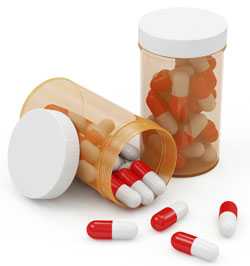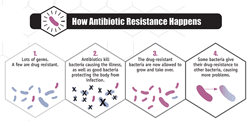Drug-Resistant Travelers’ Diarrhea

Incorrect use of antibiotics can promote drug resistance in the bacteria that cause travelers’ diarrhea. Travelers should stick to safe food and beverage practices and use antibiotics responsibly.
Travelers’ diarrhea (TD) is the most common illness among people who travel to a developing country. Although it is rarely life-threatening, it can cause discomfort, stress, and ruin a trip. Travelers who see a health care provider for a pre-travel consultation are often given antibiotics to take in case they get TD while traveling. However, incorrect use of antibiotics can promote drug resistance in the bacteria that cause TD. Recently, bacteria have emerged that are resistant to the drugs commonly used to treat TD, and the global spread of these bacteria is a threat to public health.

International travelers can spread drug-resistant bacteria around the world.
How do antibiotics promote drug resistance?
When a person gets TD, he or she is infected with millions of bacteria, a few of which may be drug resistant. Under ordinary circumstances, “normal” bacteria compete with resistant bacteria for food and other resources. The resistant bacteria do not thrive because there are so few of them. However, if the person takes antibiotics, the susceptible bacteria will die, allowing the resistant bacteria to grow and take over. The person can then spread these resistant bacteria to other people.
What is the role of the international traveler?
International travelers who take antibiotics to treat TD are at higher risk for becoming infected with resistant organisms. They can then infect their family and friends in the United States and spread the resistant bacteria around the country. CDC has reported hundreds of cases of drug-resistant diarrhea. We cannot say for sure, but travelers were likely infected overseas and spread the infection to the people they came in contact with when they returned. One person was infected by a strain of bacteria that was resistant to every antibiotic commonly used to treat TD. That person was sick with diarrhea for 7 weeks!
What can travelers do?
Travelers to developing countries can take precautions to avoid diarrhea and minimize the development of resistant bacteria.
Safe food and beverage choices can prevent TD:
- Bacteria are killed at high temperatures, so eat only food that is cooked and served hot. Food served warm or at room temperature, such as on a buffet, is a risk.
- Raw fruits and vegetables are safe only if you can wash them in clean (boiled or bottled) water or if you can peel them yourself. Avoid salads and cut-up fruits and vegetables.
- Drink only beverages from a sealed bottle or can. Water is safe if it has been boiled, so hot coffee or tea is usually okay.
- Wash your hands with soap and (safe) water before preparing food or eating.
- Download CDC’s free app “Can I Eat This?” to help you make safer food and beverage choices when you travel.
Help prevent travelers’ diarrhea by using CDC’s Can I Eat This? app. Select the country you’re in and answer a few simple questions about what you’re thinking about eating or drinking, and Can I Eat This? will tell you whether it’s likely to be safe.
Over-the-counter drugs can prevent TD:
- Bismuth subsalicylate (Pepto-Bismol, Kaopectate) taken four times per day can prevent TD. More information >>
- Some people recommend probiotics (“good” bacteria) or bovine colostrum (milk produced late in a cow’s pregnancy) to prevent TD; however, the effectiveness of these products has not been studied in depth, and they are not approved for this use by the Food and Drug Administration.
Treat the symptoms of TD:
- If you get TD, treat the symptoms with over-the-counter drugs such as bismuth subsalicylate (if you didn’t use it for prevention) or loperamide (Imodium). More information >>
- Drink plenty of (safe) water to stay hydrated.
- Remember that TD usually goes away by itself after a few days. If it doesn’t go away, see a doctor.

Use antibiotics responsibly.
Use antibiotics responsibly:
- Your doctor may give you antibiotics to treat TD, but consider using them only for severe cases.
- If you take antibiotics, take them exactly as your doctor instructs. Take all the pills in the series on the recommended schedule. If you have pills left over, throw them away.
- If severe TD develops soon after you return to the United States, see a doctor and ask for stool tests so you can find out which antibiotic will work for you.
Prevent the spread to others:
- If you have TD, wash your hands often, especially after using the bathroom.
- Do not prepare food for others while you are sick.
- Do not swim while you are sick.
Following these precautions can prevent a case of drug-resistant TD. Stick to safe food and beverage practices and use antibiotics responsibly to ensure you don’t come home with something other than memories.
More Information
More Information
- Page last reviewed: July 24, 2017
- Page last updated: July 24, 2017
- Content source:
- National Center for Emerging and Zoonotic Infectious Diseases
- Page maintained by: Office of the Associate Director for Communication, Digital Media Branch, Division of Public Affairs




 ShareCompartir
ShareCompartir
